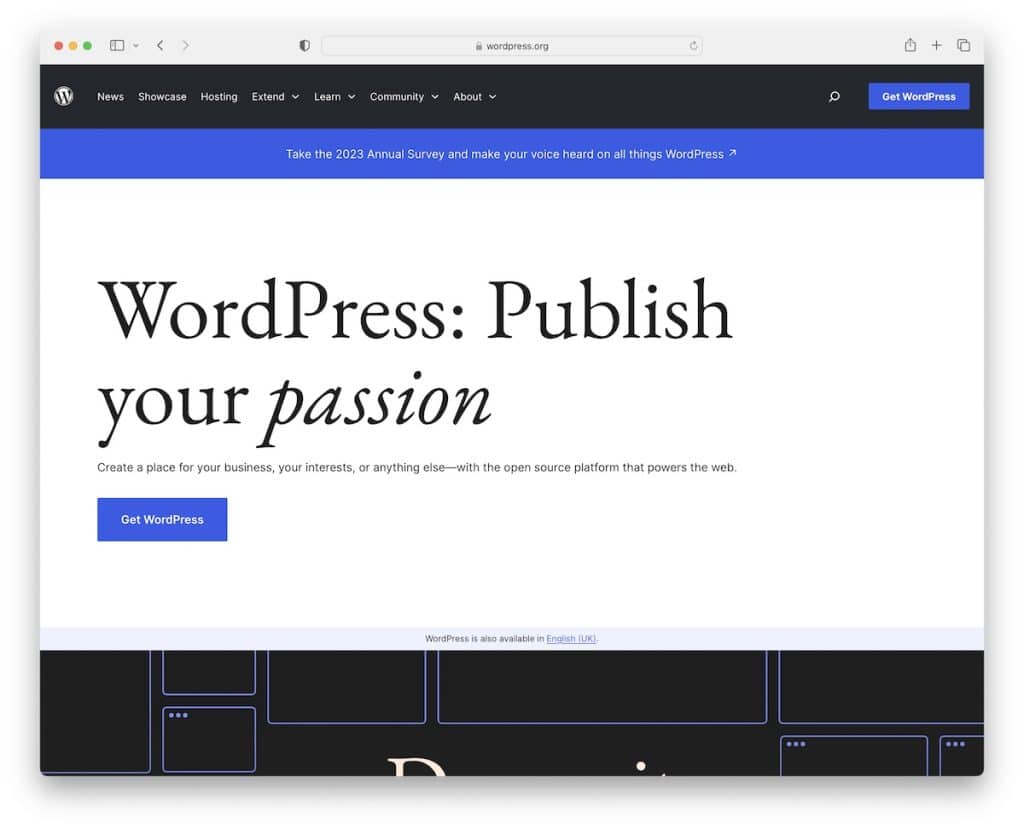Today, we’re diving into a topic close to our digital hearts: finding the best and fastest CMS solutions out there.
You’ve come to the right place, whether you’re an enthusiastic blogger, a thriving business owner, or someone passionate about creating sleek, efficient websites.
We know that in the ever-evolving world of web development, staying ahead of the game is key.
That’s why we’ve scoured the depths of the web to bring you a roundup of CMS solutions that are not just good – they’re the best of the best!
And because we value your time as much as you do, we’ve focused on those that promise to keep your site running at lightning speed.
So, let’s explore these game-changing tools together.
Our goal? To help you create a website that’s visually stunning and as quick and responsive as a cheetah on a mission.
This post covers:
The Best, Fastest CMS
Picking a fast CMS is more than just a good idea – it’s essential.
You want your website to be gorgeous, speedy, and super user-friendly, right?
That’s where a top-notch CMS comes in. The key features to look for? We’re talking about a lightweight base, user-friendly interfaces, robust security, and, of course, scalability.
And let’s not forget about SEO optimization and responsive design – because your amazing content deserves to be seen and enjoyed on any device by everyone.
Choosing the right CMS means creating a seamless, enjoyable experience for you and your audience.
1. WordPress
WordPress is often hailed as the best and fastest CMS for several reasons.
First off, WordPress is incredibly flexible. Whether you’re a blogging newbie or a seasoned webmaster, it caters to all skill levels.
Moreover, it’s designed to ensure your site runs smoothly and quickly. This means your visitors enjoy browsing your site without any frustrating lag.
But that’s not all. WordPress has many themes and plugins, allowing you to tailor and optimize your site precisely to your needs while keeping it speedy. (Pro tip: Pick a lightweight theme and install a caching plugin.)
Plus, with regular updates and a massive community of users and developers, you’re always at the forefront of web technology.
And let’s talk about SEO – WordPress is a star in this arena. It’s structured in a way that makes optimizing your site for search engines a breeze. Better SEO means more visibility, which we all want, right?
WordPress combines ease, speed, and power, so it’s no wonder it’s a favorite among web enthusiasts worldwide.
Key Features of WordPress:
- While WordPress’s core is lightweight and fast, plugins can easily extend its functionality. It ensures efficient performance, especially when combined with speed-optimized hosting.
- WordPress supports advanced caching solutions through plugins like W3 Total Cache and WP Super Cache and server-side caching technologies.
- WordPress integrates seamlessly with various CDNs, distributing your site’s content across multiple servers worldwide to reduce load times.
- Continuous updates from WordPress and a robust community of developers mean that any performance issues are quickly addressed.
Best for:
WordPress is for bloggers, small to medium-sized businesses, and anyone seeking an easy-to-use, customizable, and scalable platform with swift performance.
Pricing: WordPress is a free and open-source CMS.
2. Drupal
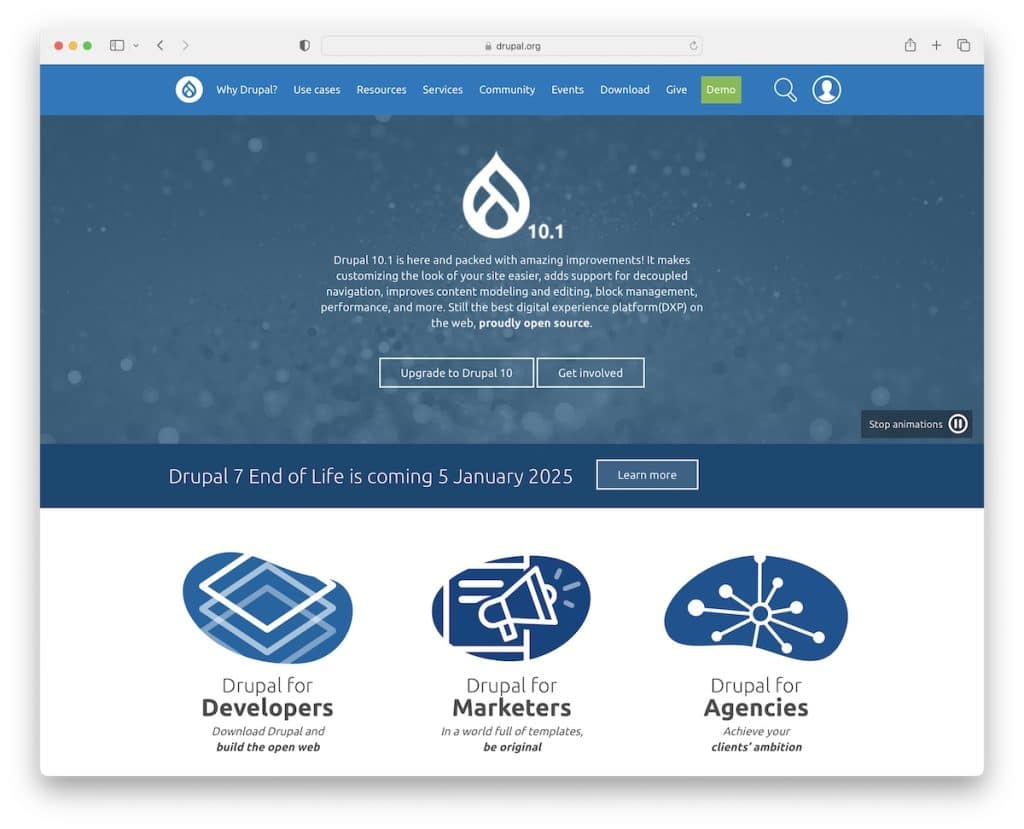
Drupal stands out as the best and fastest CMS, especially for those who love a blend of robust functionality and speed.
What sets Drupal apart is its ability to handle complex, content-heavy websites with ease. If you’re managing a site with loads of data or expecting high traffic, Drupal is your reliable, speedy companion.
Another cool thing about Drupal? It’s incredibly secure. Recognized for its top-notch security measures, it’s a favorite among government and enterprise-level websites. This means not only is your site fast, but it’s also safe as a vault.
Drupal also shines with its modular approach. You can customize it with various modules (think of them as mini-plugins), ensuring your site is lightning-fast without unnecessary bloat.
And let’s not forget the community! The Drupal community is passionate and supportive, constantly working to improve the system and keep it at the cutting edge of speed and efficiency.
In short, Drupal is a CMS that offers speed, security, and scalability.
Key Features of Drupal:
- Sophisticated caching mechanisms, like Dynamic Page Cache and BigPipe, significantly reduce page load times and enhance performance, especially for complex and content-rich sites.
- Drupal is highly optimized for handling complex websites with extensive content and high traffic. (It can manage large volumes of content and many users without a hitch.)
- Drupal has built-in web services that enable it to serve content to mobile apps, front-end JavaScript frameworks, and other systems, ensuring quick and ordered content delivery.
- Modular design allows for extensive customization through modules. (Add only necessary functionalities, keeping the site lean and fast.)
Best for:
Drupal is for large-scale enterprises, government websites, and complex, content-heavy platforms requiring robust security and high scalability.
Pricing: Drupal is free and open-source.
3. Joomla
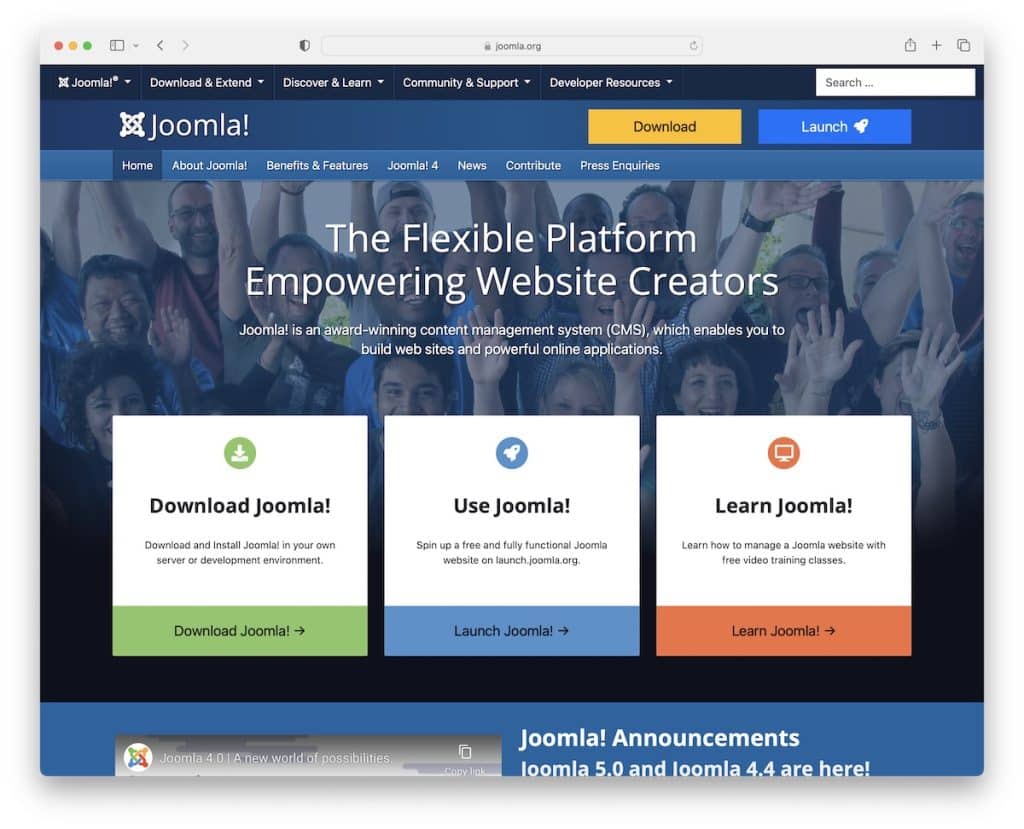
Joomla is always there to make your web experience smoother and faster.
Firstly, Joomla strikes a perfect balance between user-friendliness and powerful features. It offers a wide range of functionalities yet maintains a simplicity that makes it accessible even to beginners.
And when it comes to speed, Joomla shines. Its lightweight core and optimized code mean your website loads quickly, keeping visitors happy and engaged.
Moreover, Joomla’s robust caching system reduces load times, making your site zippy and efficient.
And for those who love to add a personal touch, Joomla’s extensive library of templates and extensions allows for great customization without compromising on speed.
Joomla also includes top-notch security features, ensuring your website is not just fast, safe and secure.
Joomla is ideal for a CMS that combines speed, ease of use, and powerful features.
Key Features of Joomla:
- Optimized core that ensures fast loading times. This is especially beneficial for websites with medium to high traffic.
- A powerful caching system significantly speeds up page loading by storing pre-generated content for quicker access.
- Despite its advanced capabilities, Joomla maintains a user-friendly interface, making it accessible for beginners and advanced users.
- Many reliable extensions enhance the website’s functionality without heavily impacting loading speeds.
- Flexible template management options to create fast-loading and responsive designs that improve the overall speed.
Best for:
Joomla is for small to medium-sized businesses, non-profits, and individuals who need a balance of power, flexibility, and ease of use for their websites.
Pricing: Joomla is free and open-source.
4. Duda
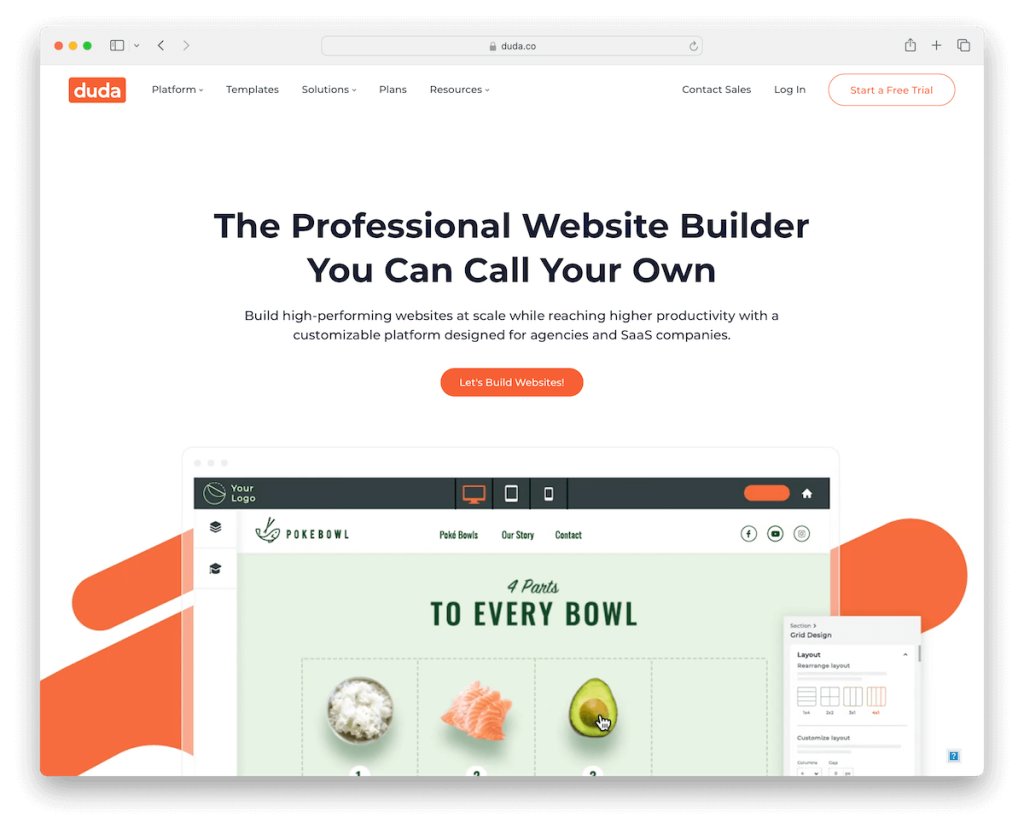
What’s cool about Duda is how it’s tailored for speed and organization, particularly for creating responsive websites for clients.
Its platform is streamlined and intuitive, meaning you spend less time figuring things out and more time being creative. Plus, its quick loading times are a dream come true, both for you and your site’s visitors.
Duda also offers some nifty features like advanced personalization capabilities. This means you can easily create unique, dynamic content for different users, enhancing their browsing experience without slowing down your site.
And for those of you who value collaboration, Duda is a gem. Its team collaboration and client management tools are top-notch, ensuring smooth workflows and happy clients.
In short, if you’re after a snappy, user-friendly CMS, and great for professional web designers and agencies, Duda is worth checking out.
It’s like having a fast, reliable, and smart partner in your web design journey.
Key Features of Duda:
- Website building capabilities to create professional-looking sites quickly with a drag-and-drop interface.
- Duda websites are hosted on optimized servers, ensuring fast loading times and reliable performance, crucial for user experience and SEO.
- Personalized user experiences with dynamic content that can change based on visitor behavior, without compromising on site speed.
- Duda prioritizes security with features like SSL certificates, website backups, and automatic updates, ensuring websites are fast and secure.
Best for:
Duda is for web designers, digital agencies, and businesses looking for a fast, intuitive, and collaborative CMS to efficiently create high-quality, personalized websites.
Pricing: Duda’s entry-level plan, Basic, costs $19/month, with a fourteen days free trial.
5. Squarespace
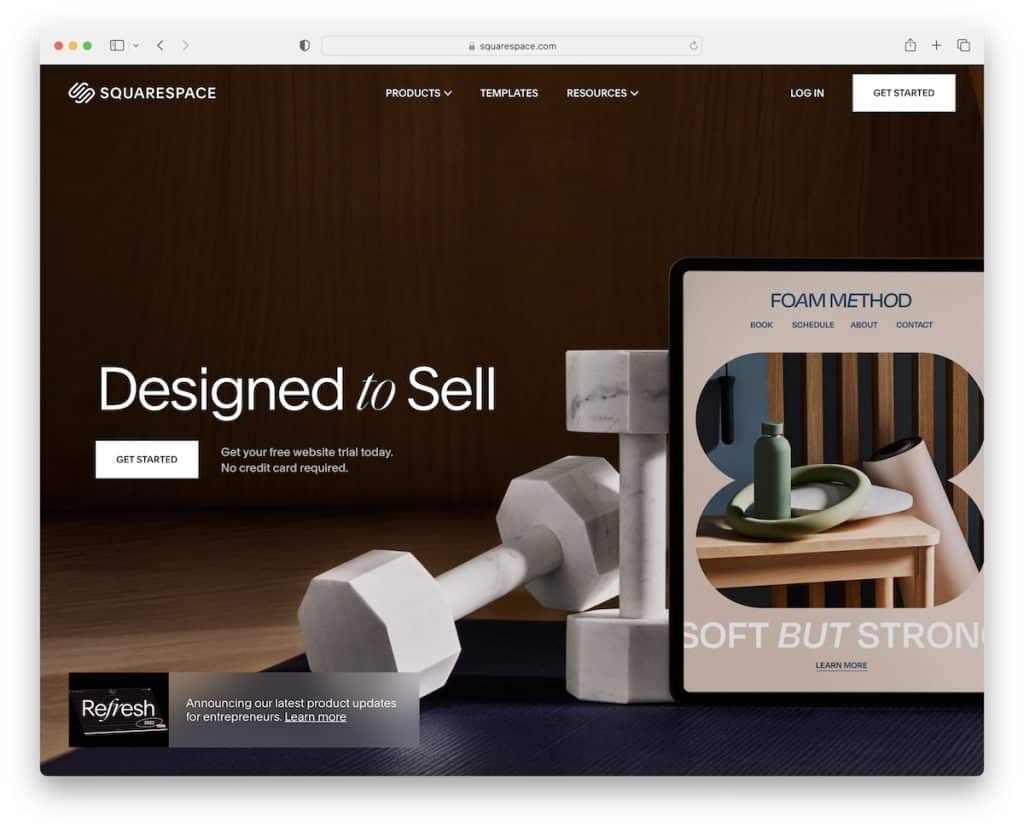
Squarespace is that all-in-one tool that makes your project look good – like, really GOOD – and works like a charm.
One of the coolest things about Squarespace is its incredibly user-friendly interface. It’s designed for those of us who appreciate simplicity and elegance.
You can create stunning, professional-looking websites without needing to be a tech wizard. And when it comes to speed, Squarespace is a natural sprinter. Its platform is optimized to ensure your website loads quickly, keeping visitors happy and engaged.
What’s more, Squarespace doesn’t skimp on features.
From gorgeous templates that are automatically responsive to powerful SEO tools, it’s got everything you need to make your site shine on the internet speedway.
And let’s talk about reliability – Squarespace provides robust hosting and security features, ensuring your site is fast, secure, and always up and running.
In essence, Squarespace is perfect for creators, entrepreneurs, and anyone who wants a beautiful, fast website without the tech hassle.
Key Features of Squarespace:
- Squarespace sites are hosted on optimized servers, which ensures fast loading times and excellent site performance.
- With free SSL certificates, strong data protection, and secure hosting, Squarespace provides a secure environment for website owners and visitors.
- Detailed analytics tools to track website performance, visitor behavior, and other key metrics, helping to optimize the site for better speed and engagement.
- Robust eCommerce features with an easy-to-use interface for quick setup and management of online stores.
Best for:
Squarespace is for entrepreneurs, creatives, and small business owners seeking an elegant, user-friendly CMS for building visually appealing, high-performing websites with minimal technical hassle.
Pricing: Squarespace has four premium pricing, starting with the Personal one at $11/month. (But you can start free for fourteen days.)
6. Wix

Let me add some exciting details if you’re curious about why Wix stands out as a top-tier express CMS.
Let’s start with images. Wix is a master at automatic image optimization. When you upload an image, no matter how big (up to 25 MB), Wix smartly resizes it for the best quality without sacrificing your site’s loading speed.
But how does it ensure your Wix site loads quickly, no matter where your visitors are? That’s where the magic of their Content Delivery Network (CDN) comes in.
This means your site content is delivered from the nearest server to your visitor, dramatically reducing loading times.
Plus, Wix uses a nifty technique called lazy loading images. Your high-resolution images don’t bog down your site’s speed. Low-res placeholders load first, ensuring a quick display, and then they’re replaced with your gorgeous high-res images.
Wix isn’t just about creating beautiful websites easily but delivering a fast, secure, and visually stunning online experience.
Key Features of Wix:
- Automatic image optimization for the best quality and fast loading. It resizes images of up to 25 MB.
- Wix uses a global network of cache services and proxy servers. Site content is delivered from the server closest to the visitor, reducing loading times.
- To maintain fast site speeds, Wix employs lazy loading, where high-resolution images are replaced with low-res versions that load quickly.
- Reliable hosting with strong security features, including SSL certificates and regular updates.
Best for:
Wix is a CMS for small business owners, freelancers, and creatives who desire a user-friendly, versatile CMS for creating fast, visually appealing, and functionally rich websites with minimal technical expertise.
Pricing: You can start with Wix for free, but you unlock plenty of rewarding features with their entry-level plan, at $10/month. (You also have solutions for businesses and online stores.)
7. CrafterCMS
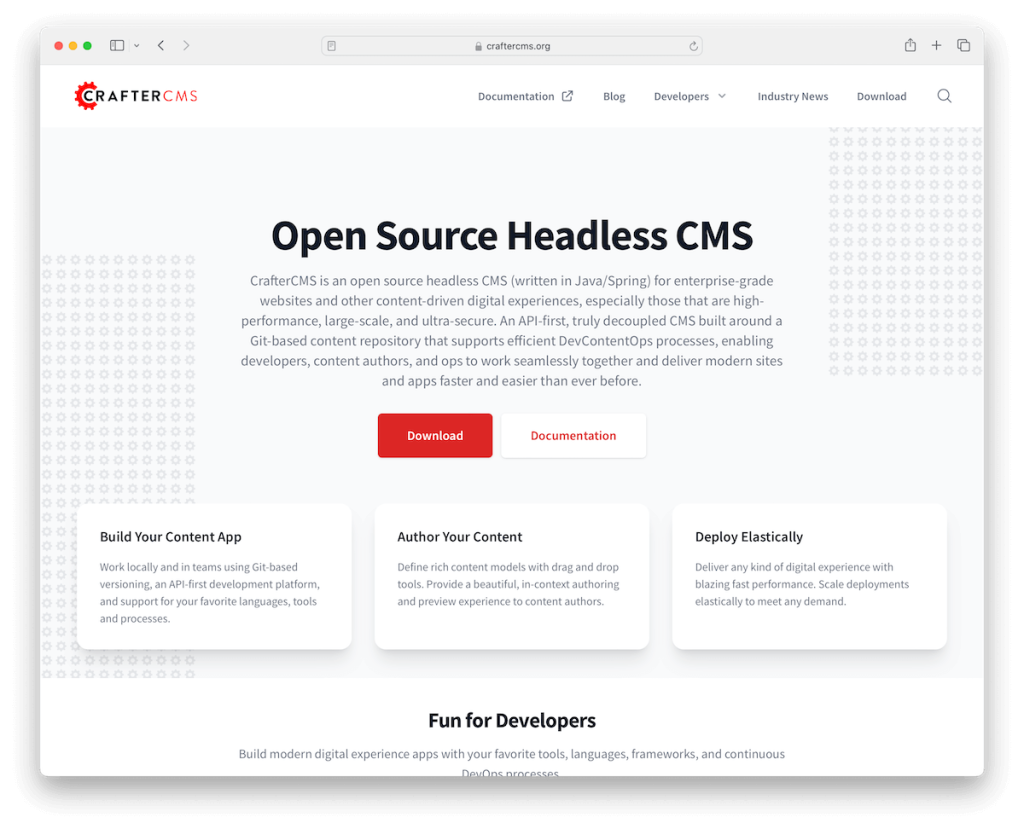
CrafterCMS stands out for its modern, Git-based approach. This means you get the best of both worlds – cutting-edge technology and ease of use. It’s superb for managing dynamic, rich content experiences, and the speed? Top-notch!
CrafterCMS offers native GraphQL server support. This means you get a supercharged, dynamic schema management that’s mind-blowingly fast.
CrafterCMS’s headless architecture allows for lightning-fast content delivery across various digital platforms – web, mobile, or IoT. And for those who love to keep things fresh and engaging, CrafterCMS makes updating content a breeze.
Security and scalability are also where CrafterCMS shines. It effortlessly handles high traffic volumes while keeping your data safe, making it a reliable choice for businesses of all sizes.
If you’re after a CMS that offers speed, flexibility, and a forward-thinking approach, CrafterCMS is a brilliant choice.
Key Features of CrafterCMS:
- CrafterCMS offers native GraphQL server support, enabling dynamic schema management and fast data access.
- It uses a Git-based repository for content versioning, offering unparalleled speed, scalability, and flexibility.
- The platform excels in managing dynamic, rich content experiences, allowing for real-time updates without impacting site performance.
- The CMS offers a range of developer-friendly tools and integrations for customizations and extensions to fit various project requirements.
Best for:
CrafterCMS is for developers and enterprises requiring a high-performance, scalable, and versatile CMS for managing dynamic, content-rich web applications and multi-channel digital experiences.
Pricing: CrafterCMS is free and open-source.
8. Strapi
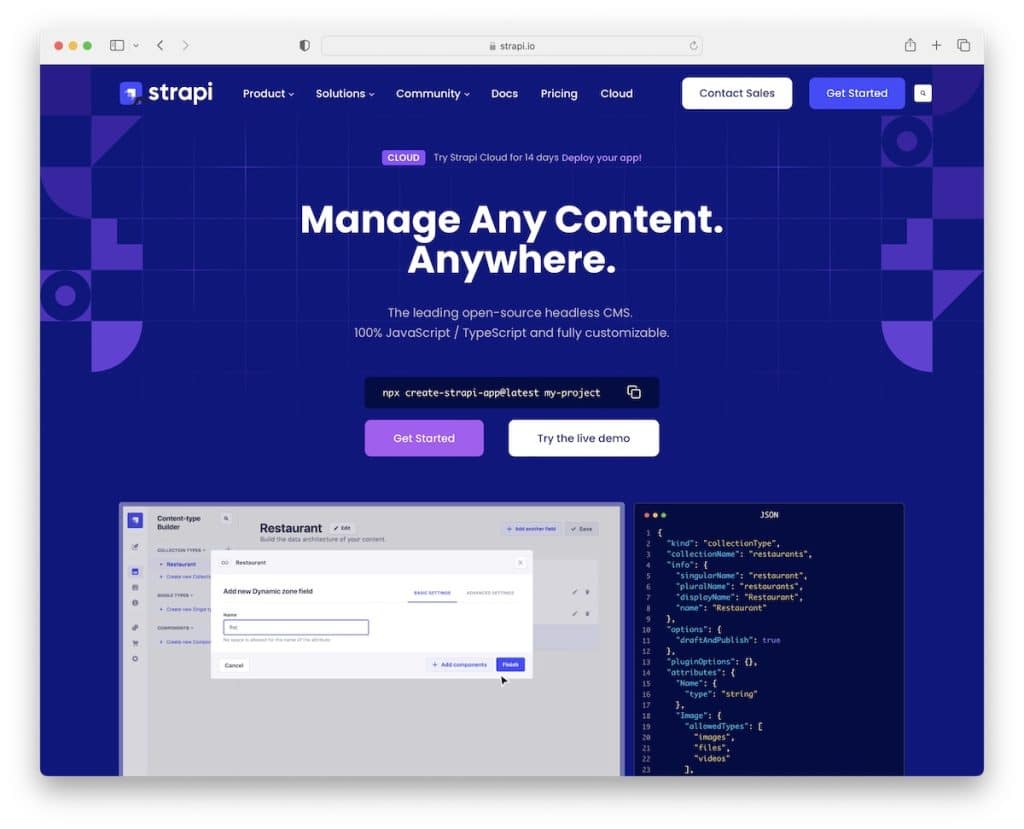
Strapi allows you to manage and distribute your content anywhere, any way you want, without the confines of a traditional CMS.
It seamlessly adapts to your needs, whether you’re feeding content to websites, apps, or other platforms.
Strapi is all about giving you control. Its API-first approach means you get a super-fast, efficient back-end, while choosing how and where your content appears. This flexibility is a game-changer for developers looking to build bespoke digital experiences.
But what sets Strapi apart is how it embraces the modern JAMstack architecture. This translates to lightning-fast page loads, improved security, and a delightful experience for creators and users.
And let’s not forget the community! Strapi’s got a vibrant, supportive community, constantly innovating to keep the platform ahead of the curve.
So, for those who love speed, flexibility, and control, Strapi is a fantastic choice.
Key Features of Strapi:
- Headless CMS provides backend management of content that can be delivered across different platforms via APIs, ensuring fast and flexible content distribution.
- Create and manage APIs quickly and easily for seamless integration with various front-end solutions and ensure well-run data handling.
- Strapi fits perfectly into the JAMstack architecture, promoting faster, more secure websites with better performance and scalability.
- Host the CMS wherever you prefer, allowing for optimized performance and control over your content and its delivery.
Best for:
Strapi is for developers and businesses seeking a highly customizable, API-driven headless CMS that effectively manages and delivers content across multiple platforms with speed and flexibility.
Pricing: Strapi is free and open-source. But it also has paid plans for enterprise solutions and those who prefer to host with Strapi via cloud.
9. Sanity

Sanity brings a new level of creativity and efficiency to your digital projects while ensuring they are fast.
It offers a customizable editing environment where you can shape your content exactly how you envision it.
Sanity is a headless CMS that manages your content in one place and distributes it anywhere, whether it’s websites, apps, or other platforms. It ensures your content delivery is as quick as a flash.
Sanity is also about giving you complete control. Its real-time collaboration features make team projects a breeze, and its strong focus on structured content means your data is presented beautifully and organized.
Moreover, it has plenty of plugins to take your website performance to the next level.
Sanity is your go-to choice when unmatched speed, flexibility and creative edge are the characteristics you are after.
Key Features of Sanity:
- Sanity Studio offers customizable editing environments to fit specific content structures and workflows, offering unparalleled flexibility.
- It uses a structured content approach, allowing content to be stored in a way independent of its presentation, making it reusable and easily accessible.
- The platform offers a powerful and flexible API for content queries, Groq, for precise content retrieval.
- As a headless CMS, it manages content in a backend-only system, enabling seamless distribution across various channels and platforms.
Best for:
Sanity is for developers, content teams, and organizations seeking a highly customizable, collaborative, and fast headless CMS for streamlined content management across multiple platforms.
Pricing: Sanity is free and open-source. Or you can pick the Growth plan for $15/month per user and seek more information if interested in the Enterprise solution.
10. Prismic
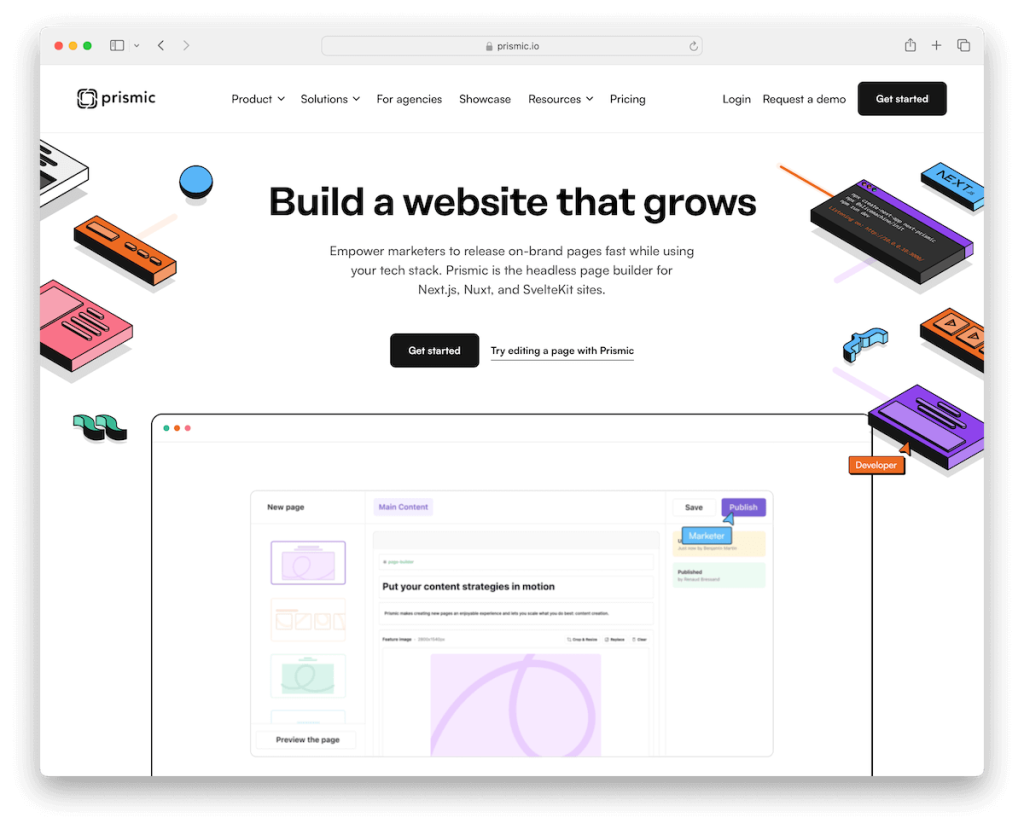
Prismic always delivers exactly what you need, quickly and with solid reliability.
It shines with its simplicity and efficiency. Its headless CMS handles your content in the back end and serves it wherever you need it – be it websites, apps, or other digital platforms.
This approach speeds up the content delivery process and opens up creative possibilities.
What we also like about Prismic is its user-friendly content editing interface. It’s designed for those who appreciate an intuitive, no-fuss experience. You can easily manage your content without getting bogged down by complicated workflows.
And the customization? You can tailor your content management to fit your unique needs, ensuring your website is as fast as it is functional.
Prismic is a fabulous choice if you’re looking for a quick, straightforward, and adaptable CMS.
Key Features of Prismic:
- The platform automatically optimizes images for the web, ensuring fast loading times without sacrificing image quality.
- It provides a robust API for content delivery, and its flexible approach allows developers to use their preferred technologies and frameworks.
- Prismic’s Slices feature lets you build pages with modular sections, providing content layout and design flexibility while maintaining fast content loading.
- It includes content versioning and scheduling capabilities, allowing for better content planning and management.
Best for:
Prismic is for marketers, content creators, and developers seeking a user-friendly, flexible headless CMS that excels in delivering fast, structured content across multiple digital channels.
Pricing: Prismic’s free plan is free and open source, while premium ones start at $150/month.
11. Magnolia
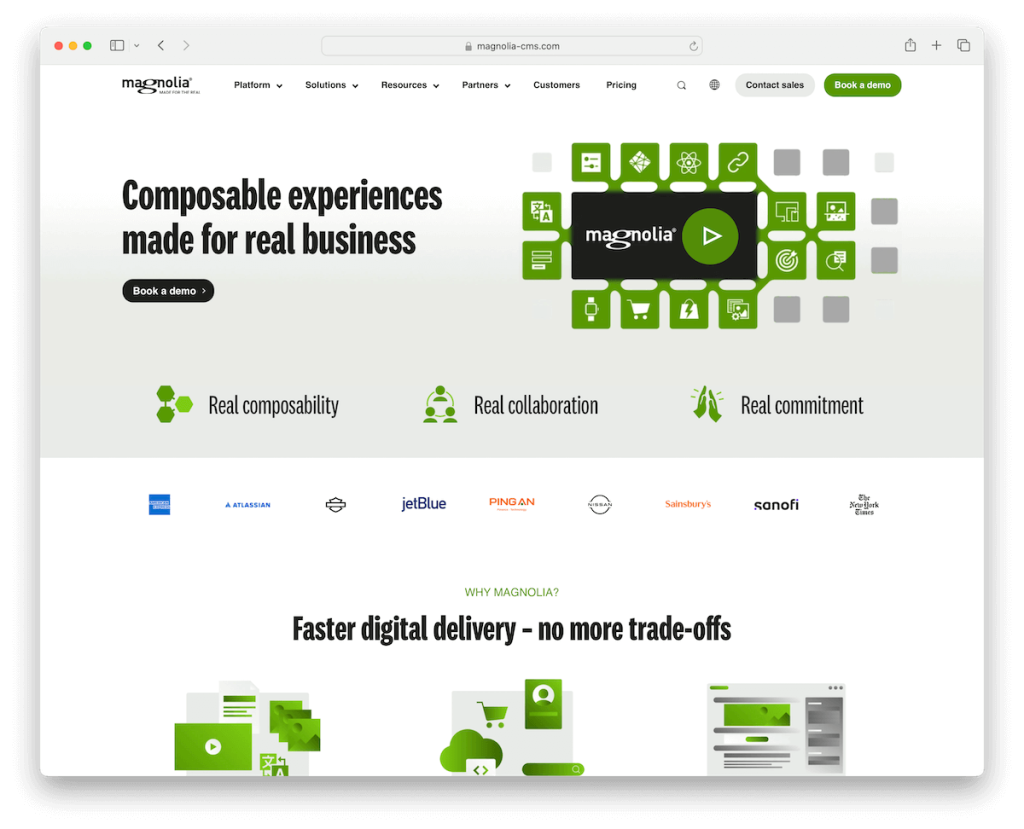
Magnolia stands out for its unique ability to blend enterprise-level strength with a surprisingly straightforward and manageable interface.
It’s like having the best of both worlds: the power to handle massive, complex digital experiences and the simplicity to make managing content a breeze.
What sets Magnolia apart is its intelligent content management approach. It provides personalized experiences at a blazing speed, ensuring your users get what they need without any waiting around.
And when it comes to integration, Magnolia seamlessly integrates with your existing tools and technologies. Thus, it is a versatile addition to any digital ecosystem.
Magnolia also shines in terms of security and scalability. It’s built to grow with your needs while keeping everything locked down and secure. Magnolia scales alongside you whether you’re a small business or a large enterprise.
Magnolia does the trick if you’re looking for a powerful and approachable CMS.
Key Features of Magnolia:
- Magnolia offers a hybrid headless CMS approach, allowing for both traditional and headless content delivery. This gives you flexibility and speed in content management and distribution.
- It is built on a modular architecture to add or remove functionalities as needed, ensuring agility and efficient performance.
- Robust security features make it a reliable choice for enterprises and organizations with strict security requirements.
- Easily integrating with various third-party systems and applications, including eCommerce, analytics, and marketing tools.
Best for:
Magnolia is for large enterprises and organizations that require a robust, scalable CMS capable of handling complex, multi-channel content management with advanced personalization and integration capabilities.
Pricing: Magnolia is free and open-source. It also has Self-Hosted DXP solution for $3,000/month or Cloud DXP with custom pricing.
What Is The Most Secure CMS
Explore the top three fastest CMS solutions, each uniquely tailored to enhance your website’s speed and productivity:
- WordPress excels in ease of use and flexibility, offering a vast array of themes and plugins that, when optimized, can make it one of the fastest CMS options available. Its widespread use and strong community support contribute to its ability to provide a swift and seamless user experience.
- Drupal stands out for its robust performance and scalability, making it a preferred choice for complex, content-heavy websites that require speed and efficiency. Its advanced caching mechanisms and optimized codebase ensure a fast and reliable experience, particularly for enterprise-level sites.
- Joomla balances power with user-friendliness, offering a range of customizable features that can be optimized for speed. Its robustness in managing both simple and complex websites, coupled with a strong emphasis on performance, makes it a fast and versatile CMS solution.
How To Get Started With WordPress
- Choose hosting: First, you’ll need a home for your WordPress site. Select a reputable hosting provider that offers dedicated WordPress hosting. This ensures optimal compatibility and speed. Look for providers with one-click WordPress installation for added convenience. (Don’t miss our guide on how to choose WordPress hosting.)
- Install WordPress: Once you’ve chosen your hosting, install WordPress. Many hosts offer a one-click installation process, making this step a breeze. If you’re going DIY, download WordPress from wordpress.org and follow their installation guide.
- Select a theme: Now for the fun part! WordPress offers thousands of themes, both free and paid. Choose one that aligns with your site’s purpose and aesthetic. Remember, a clean, lightweight theme often means faster loading times. (Check our tested collection of the fastest WordPress themes.)
- Add essential plugins: Plugins extend the functionality of your WordPress site. Start with the essentials: SEO tools (like Yoast SEO), security plugins (like Wordfence), and caching plugins (like W3 Total Cache) to improve site speed and performance.
- Create your key pages: Craft your basic pages – Home, About, Contact, Blog, etc. These are the backbone of your site. WordPress makes it easy with its intuitive editor – click “Add New” under your dashboard’s “Pages” section.
- Customize and optimize: Tailor your site to your liking. Customize your theme settings, set up your navigation menus, and don’t forget to optimize for speed and SEO. Regularly update your content, themes, and plugins to keep your site running smoothly and quickly.
Pro tip: Don’t miss our extensive guide on how to speed up a WordPress site.
Frequently Asked Questions (FAQs)
What makes a CMS fast and efficient?
A fast CMS is optimized for speed, with efficient coding, good caching mechanisms, and streamlined content delivery. It should also be well-supported by robust hosting solutions.
Is WordPress the fastest CMS?
WordPress can be very fast, especially with the right hosting, themes, and plugins. However, its speed can vary depending on customization and how well it’s optimized.
Can a fast CMS improve SEO?
Absolutely! Faster page load times are a key factor in SEO, as they improve user experience, which is highly valued by search engines like Google.
What is a headless CMS and is it faster?
A headless CMS separates the back-end content management from the front-end display, which can lead to faster content delivery and more flexibility in how content is presented.
How important is hosting for a CMS’s speed?
Extremely important. Even the fastest CMS can be slowed down by poor hosting. Choosing a host with strong performance and dedicated CMS support is crucial.
Does the number of plugins affect CMS speed?
Yes, too many plugins, or poorly coded plugins, can significantly slow down a CMS by adding extra load to the server.
How does CMS caching improve speed?
Caching temporarily stores copies of content to reduce server load and decrease page load times, significantly speeding up content delivery to the user.
Can custom themes impact CMS speed?
Yes, heavily customized or poorly optimized themes can slow down a CMS. It’s best to use lightweight, well-coded themes for optimal speed.
What are some fast CMS options for eCommerce?
Shopify and WooCommerce (for WordPress) are popular for their balance of speed, functionality, and user-friendliness in e-commerce contexts.
Was this article helpful?
YesNo
